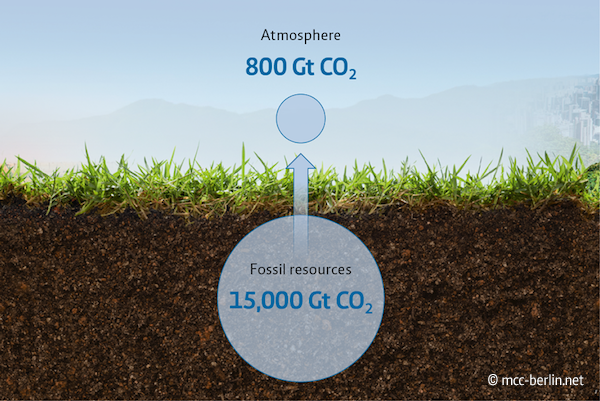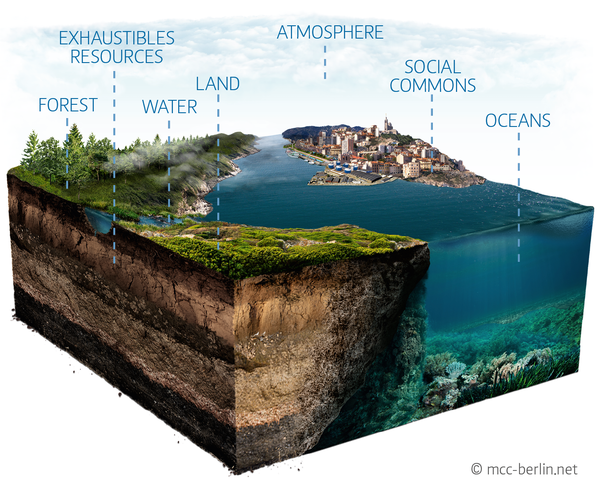Research
Contents
> The problem: Overuse and under-provision of global commons
> The challenge: Governance of global commons
> Our contribution: Knowledge for solutions and fostering debates
The problem: Overuse and under-provision of global commons
We define global commons as natural resources requiring global cooperation for their sustainable use and provision, such as the atmosphere, land and forests. Global economic growth has led to the overuse of these assets though: The atmosphere has been overburdened as a depository for greenhouse gases leading to climate change, increasing global demand for agricultural products and urban sprawl has intensified pressure on land and led to rising food prices and the destruction of rain forests.
In addition to this overuse, there is an under-provision of the so-called social commons. These are public goods providing access to health services, education, clean water, sanitation, energy, or transport and communication infrastructure. They are essential for human well-being as the level of provision of these goods has significant effects on both growth and inequality. We therefore include them in our understanding of global commons and in our research work (see figure). Consequently, the role of cities and the infrastructures provided therein is another focus of MCC’s research.
The challenge: Governance of global commons
The 21st century challenge of managing the global commons is twofold: first, avoiding the overuse of global commons where no effective governance mechanisms regulating access and use are yet in place and, second, overcoming the under-provision of public goods, such as certain infrastructure, that are essential for human well-being.
To maintain global prosperity and human well-being, a technological, social and political transformation is required that establishes a sustainable governance of global commons. There are three aspects making that inherently difficult:
- First, global commons are either outside national jurisdiction or their conservation and sustainable use conflicts with national sovereignty and regulation. Their use may affect different levels of governance in distinct ways, often requiring global cooperation.
- Second, global commons also interact with one another, i.e. management of one common will most likely impact the use of others, thereby making effective governance a complex task.
- Third, the implementation of policies to govern global commons will conflict significantly with existing patterns of resource use, sovereignty rights and related well-established interests.
While Nobel Laureate Elinor Ostrom and others have made great progress towards understanding the management of local common pool resources, Ostrom pointed out the need for more research into the governance of global commons in order to face the challenge of establishing global institutions to manage biodiversity, climate change, and other ecosystem services.
MCC addresses these multiple-objective, multi-level commons governance problems jointly. It aims to assess trade-offs, to exploit synergies and to address the distributional dimension of the challenge.
Our contribution: Knowledge for solutions and fostering debates
Our research is carried out in six working groups and a Policy Evaluation Lab. Research group leaders stem from a large variety of backgrounds, which enables a truly transdisciplinary approach:
- Economic Growth and Human Development
- Land Use, Infrastructure and Transport
- Sustainable Resource Management and Global Change
- Governance
- Scientific Assessments, Ethics, and Public Policy
- Applied Sustainability Science
- Climate and Development
- Policy Evaluation Lab
We want to provide the scientific basis for solutions related to global commons problems as well as to initiate and play an active role in the intellectual debate, e.g. via publications in scientific journals and in major media outlets. MCC’s research is therefore guided by three key questions. These focus on the causalities and processes related to global commons, on policy options to govern global commons, and on the design of the science-policy interface. In this context, MCC evaluates different property rights and governance regimes for managing the global commons.
1. Which processes drive the dynamics underlying the provision and use of global commons?
We assess the extent to which natural assets such as the atmosphere, land and forest, and social assets, such as public infrastructure, have characteristics of common pool resources requiring management as global commons. This involves the evaluation of different property rights and governance regimes. One particular example is an investigation into whether tropical forests have the character of a global commons, even as they fall within the sovereign jurisdiction of states. Their resource as a global commons lies, for example, in their status as a potentially untapped pool of genetic resources with value for future medicine.
Another aspect is the forests´ function as an important sink for GHGs. MCC’s research has shown that most of the global coal reserves and resources would need to remain underground if the target to limit global temperature increase to 2°C is to be achieved (see figure 2). This has significant distributional implications between and within societies.

Figure 2: The fundamental challenge of climate policy: there are still plenty of fossil resources in the ground, but the disposal space for CO2 in the atmosphere is limited (Source: MCC)
2. What are the policy options for governing the global commons? How can a fair, equitable and efficient access to global commons be achieved?
An example: in a study, the MCC analysed a policy option that addresses the overuse of the atmosphere and at the same time the under-provision of public goods. The finding is that in most countries both problems could be tackled together – by using revenues from carbon pricing to finance access to clean water, sanitation and electricity as well as to contribute to climate protection.
3. How should the science-policy interface be designed to achieve a sustainable governance of the global commons?
MCC systematically reflects on existing processes of scientific policy advice and assessment making (on the design, formats and content), and it advises relevant institutions on improving them. For instance, MCC substantially contributed to the debate about a reform of the Intergovernmental Panel on Climate Change (IPCC) in multiple ways.
Read more about our work in policy dialogue.






